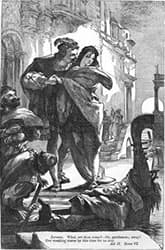The Merchant of Venice
Critique • Quotes
 Illustration, 1830 edition
Illustration, 1830 editionFirst publication
1597
Literature form
Play
Genres
Comedy, drama
Writing language
English
Author's country
England
Length
Five acts, 2,701 lines, approx. 22,000 words
Lessons slowly learned
The major issue of contention whenever The Merchant of Venice comes up, of course, is the portrayal of Shylock, the Jewish money-lender, the villain of the piece for the most part. So let's deal with that first.
On the side of those who claim the play is anti-Semitic are the comments, derogatory if not outright racist, made by other characters about Shylock, as well as his usurious, money-grubbing depiction—surely a stereotypical portrait of Jews.
On the other side are the historical fact that Jews were cast in the role of money-lenders in Shakespeare's time, the sympathetic portrait of Shylock's daughter, and that "If you prick us, do we not bleed" speech which indicates Shakespeare was aware Shylock had been moulded by Christian persecution and Christian example into the man he became.
So was Shakespeare racist? Is the play racist?
No more—and probably quite a bit less—than general public opinion was at the time. I have a small (but not absolute) problem with judging a culture's and a century's morality by the standards of another place and time. And Shakespeare's humanity overcame the prejudices of his own place and time better than most people then or now.
Reinterpretation without rewriting
However, when the play is produced in this day and age, I see no reason to reproduce the views that are indeed racist in our time, however differently they were perceived then. Our actors, our directors and our audiences must find the interpretation that is meaningful and useful for us today. This is quite often accomplished, so much so that the role of Shylock is considered a great opportunity for leading actors, Jewish or otherwise, to make an anti-racist statement. A deep understanding of Shakespeare allows this interpretation without any rewriting. (The sexist plot of The Taming of the Shrew is another matter. Admirable efforts to present this play in an acceptable modern light usually involve twisting the characters and sometimes the text far from what is encompassed in Shakespeare's vision.)
What I cannot understand though is why this play has often been the introduction to Shakespeare for high-school students. I studied Merchant of Venice in ninth grade without any discussion of the racist aspects. The image of a money-obsessed, villainous, whiny Jew was just accepted as a fact of life. I understand this is no longer universal in schools. Good thing. The Merchant of Venice is a great play but it has to be presented in a manner to engender understanding, rather than perpetuate hateful stereotypes.
That having been said, The Merchant of Venice is about more than a nasty Jewish businessman seeking his pound of flesh and in the end being denied "justice" on a technicality.
What glitters
Shakespeare has adapted four stories from other sources and forged them into one drama: the pound of flesh story, the romance of suitors having to choose among three caskets to win the hand of a rich heiress (Portia), the love and elopement of Jessica with Lourenzo, and the subplot concerning the wedding rings that Bassanio and Gratiano are tricked into giving their disguised wives. Knowing this, one has to be amazed at how much the play comes across as a single, unified drama. It's one entertaining comedy of love, romance and intrigue—with weighty undertones.
One indication of the long-term effect of the play is how many ideas and expressions have entered into our culture's daily discourse. Apart from the Shylock-related "pound of flesh" and "hath not a Jew" phrases are others you may not realize are from The Merchant of Venice,:
"All that glisters is not gold."
"In the twinkling of an eye."
"It is a wise father that knows his own child."
"The devil can cite Scripture for his purpose."
Not to forget, "the quality of mercy is not strained". In fact, I can't forget it, as it began the speech that millions of school children had to memorize in my day. And overrated in my view then and now.
So let's finish up by returning to that more cutting and moving speech delivered by Shylock in his defence. It's worth repeating:
"If you prick us, do we not bleed? If you tickle us, do we not laugh? If you poison us, do we not die? And if you wrong us, shall we not revenge? If we are like you in the rest, we will resemble you in that. If a Jew wrong a Christian, what is his humility? Revenge. If a Christian wrong a Jew, what should his sufferance be by Christian example? Why, revenge. The villainy you teach me, I will execute, and it shall go hard but I will better the instruction."
So much in those words. Logical argument. Pleading. Self-righteousness. Humanism. Bitterness. Hatred.
By defeating Shylock, the play both confirms his analysis and negates it by moving on from it. To a new instruction. And to hope.
It's just taking us several centuries to learn the lessons.
— Eric
Critique • Quotes

